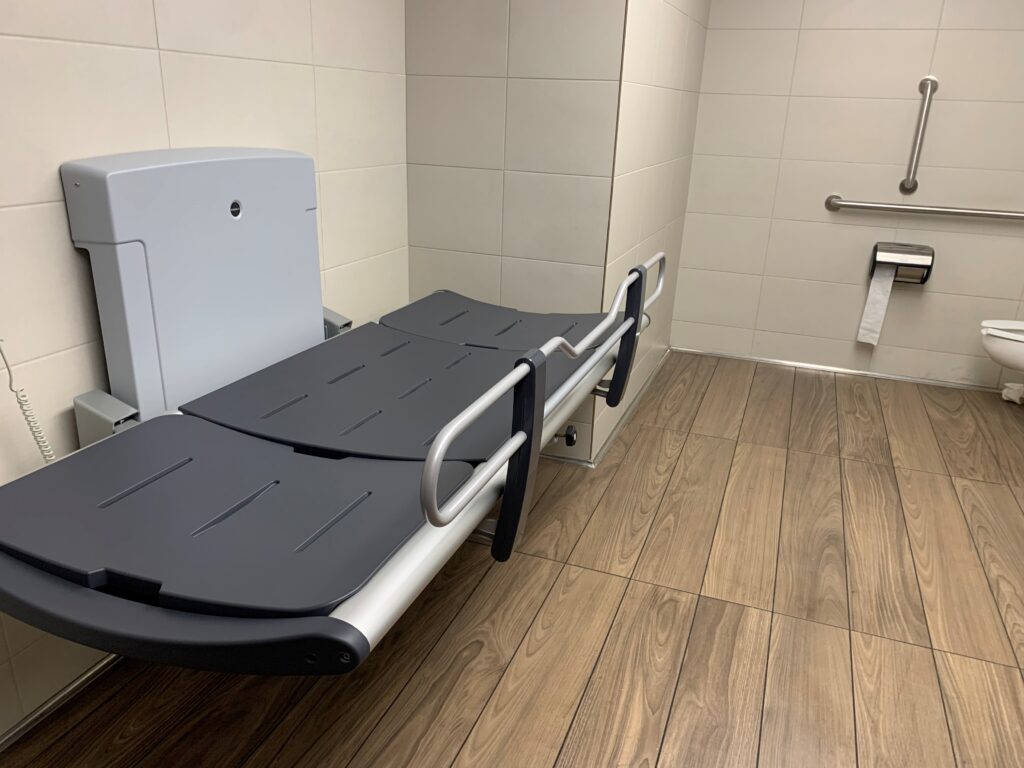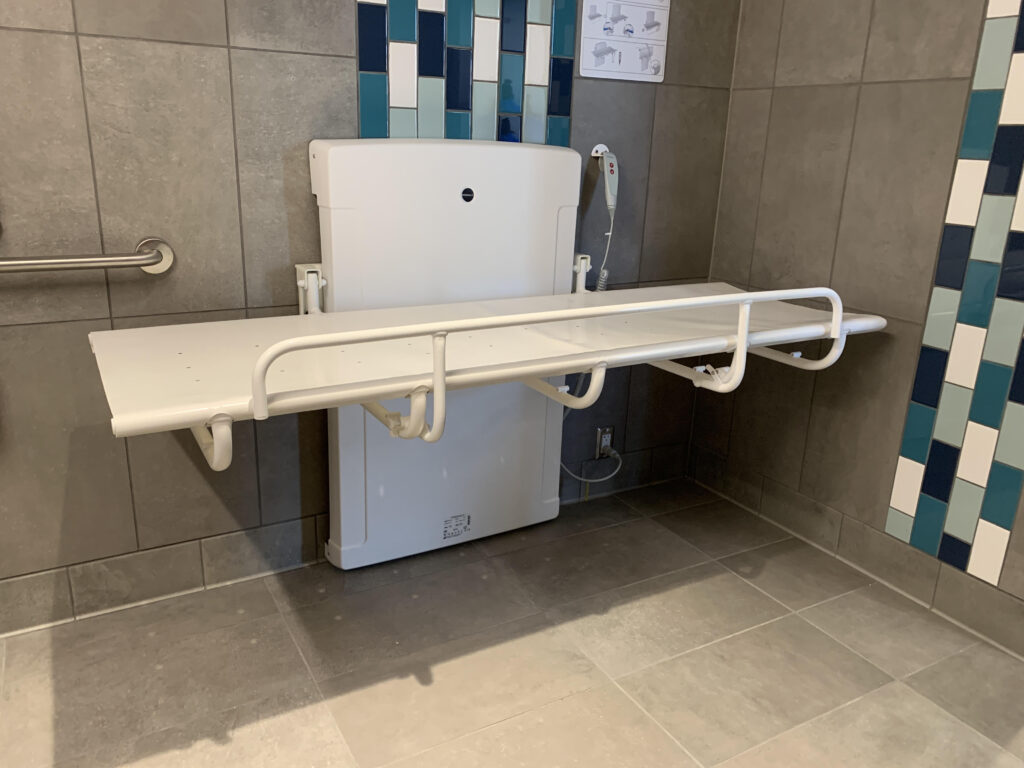
An Inside Look at How Adult Height Adjustable Changing Table Advocates are Driving Change and Improving Accessibility, Part 2
States across the country are embracing adult changing tables, providing a blueprint for how other states can do the same.
In Part 2 of our two-part series, the Building Safety Journal takes a look at how states across the country are embracing adult changing tables with grants, legislation and expedited rulemaking. Read Part 1 here.
While the journey to widespread adoption of the 2024 International Building Code® (IBC) has only just begun, a growing number of states, businesses and other organizations are beginning to recognize the need for changing tables that serve people of all ages.
In April 2022, the Tennessee General Assembly voted to provide $5,000 grants to 200 businesses and municipalities that install universal changing tables, for a total of $1 million – twice the amount advocates requested. This inspired people like Jennifer Corcoran, Program Consultant for the Montgomery County Board of Development Disabilities Services (MCBDDS) in Dayton, OH and Co-Lead of Changing Spaces Ohio, to explore grant options in her state.
Marking Several Big Wins in Improving Accessibility with Adult Changing Tables
Corcoran, who also co-founded the Inspired Access Foundation, said there have been “several big wins” in Ohio.
One involves the Ohio Department of Transportation (ODOT), which will add adult changing tables to 28 renovated rest stops over the next few years. She and her co-lead at Changing Spaces Ohio, Kim Boulter, persuaded ODOT after showing them a table at the Delaware County Board of Developmental Disabilities. Funds for additional adult changing tables are also in Ohio Governor Mike DeWine’s fiscal year 2024-2025 budget.
“Kim Hauck, Director of Ohio Department of Developmental Disabilities, is backing this 100 percent,” said Corcoran. “I believe that’s how it got put into Governor DeWine’s proposed budget. Funds will go across the state of Ohio, so that’s another huge win.”
Corcoran and Boulter have also spoken to 70 superintendents from the various county boards. They explained what was being done in Montgomery County and how they used funds from the American Rescue Plan Act (ARPA) to purchase and install adult changing tables.
Their strategy includes the purchase of two portable height-adjustable tables, which they provided for the Ohio Developmental Disability Awareness and Advocacy Day that took place on March 1, 2023, at the Ohio Statehouse. This allowed people who need adult changing tables when attending and talking to their legislators.
After the event, MCBDDS decided to keep one of the portable tables to loan out to organizations in the community, which included the Montgomery County Fair as well as the Ohio State Fair. Corcoran is working with other festivals and organizations within the area as well.
It’s important to note that while appropriate for temporary use in existing public buildings that aren’t being altered, these portable changing tables are not permitted for new construction. Specifications and requirements for permanent adult changing tables are included in the 2024 IBC.

Public Venues are Becoming More Accessible to Individuals
MCBDDS is also working with Dayton International Airport to install adult changing tables, as well as the Dayton Art Institute, which has a strategic plan to address overall accessibility. Even some parks in Montgomery County – which remain difficult because of the existing size of their buildings – will have adult changing tables in the not-too-distant future.
Separately, Boulter (through her work with Changing Spaces) advocated for John Glenn Columbus International Airport (CMH) to include universal changing tables. CMH responded by purchasing a portable universal changing table that can be requested for use in any family restroom at the airport. The airport is building a new terminal and plans to provide permanent accommodations once construction is complete.
To help people find their nearest table (and better advocate for tables within areas that lack them), the Inspired Access Foundation created and funded an interactive map for Changing Spaces that includes known table locations throughout the US.
Inspired by the great work accomplished by Corcoran and MCBDDS, other county boards are now reaching back and sharing their own plans for how they can advocate within their own communities.
Corcoran considers this another huge win.
“I’ve always joked to my son, ‘I don’t know if it’s going to happen in our lifetime, but we’re going to spend our life pushing the world to this spot,’” said Corcoran. “The growth I have seen in this endeavor in the last year and a half helps me feel like it’s going to happen faster than I would have imagined. And, truthfully, it’s this code. The IBC and the work of the International Code Council has made this happen much more quickly and I think will have the largest impact to date.”
Minnesota Embraces Adult Changing Tables
In addition to Tennessee and Ohio, Minnesota is also well on its way to providing greater accessibility in public places.
Governor Tim Walz recently signed into law a requirement for adult changing facilities in the Minnesota State Building Code. This came about after Representative Kim Hicks introduced a bill as part that will pave the way for adult changing tables in new building construction.
Greg Metz, Construction Plan Review Manager for the Minnesota Department of Labor and Industry’s (DLI) Construction Codes and Licensing Division, said that the bill caught the attention of DLI staff members, including Karen Gridley, DLI’s Accessibility Specialist. They formed a Technical Advisory Group as part of their ongoing initiative for adult-sized changing facilities.
“Having the completed model code language available opened the door for DLI to work with Rep. Hicks to recraft the bill language to require adult-sized changing facilities,” said Metz. “DLI was able to redirect the scoping and technical criteria so the State Building Code could model criteria after the national model codes and standards and update them on a regularly scheduled periodic basis.”
According to Amanda Spuckler, Rules Specialist with DLI’s Construction Codes and Licensing Division, DLI is required to adopt model codes every six years following the rulemaking process of the Minnesota Administrative Procedures Act. She said that normal procedures involve a very rigorous, two-year process – in some instances, it may take longer.
For example, DLI plans to adopt the 2024 International Codes® next, but they won’t become effective in Minnesota until sometime in 2026. To ensure that adult changing facilities would be deployed more quickly, the Minnesota State Legislature granted DLI the authority to adopt rules using an expediated process. This will allow for the adoption of the rule in one year or less.
“There are two reasons for the urgency,” said Karen Gridley, Minnesota State Accessibility Specialist and Construction Code Representative with DLI’s Construction Codes and Licensing Division. “One is a response by the legislature to address this specific accessibility feature that has been identified by multiple Minnesota constituents as desperately needed for many. The other is that some larger entities, such as the University of Minnesota and the Minneapolis-St. Paul International Airport, is proactively implementing adult changing facilities in their buildings using general best practice guidelines. As more of these facilities are provided, it is important that the rules that form the Minnesota State Building Code include requirements that ensure accessible, consistent, appropriately designed installation.”
Never Stop Pursuing the Accessibility Created by Adult Changing Tables
As other states and businesses pursue their own adult changing table initiative, Janice Saddler Rice, Director of Communications for MCBDDS, encourages them to connect with Changing Spaces.
“It’s important to understand that if you don’t have a restroom that will accommodate this kind of table, don’t stop pursuing one,” Saddler Rice advised.
While some institutions may be hesitant to get started, Saddler Rice said that MCBDDS took the initiative to develop an adult changing table program all on its own. She wants other organizations and government entities to understand that they can do the same by applying for grants.

In addition to securing funds from the American Rescue Plan Act, MCBDDS has collaborated with a municipality and a park district to request funds available through the Ohio Department of Natural Resources.
She added that collaboration can increase the chances of securing a grant, which in turn increases the likelihood that the necessary upgrades will be made, and restrooms will become accessible to all individuals.
“It’s important to educate folks because there are a lot of well-intentioned people trying to make their locations accessible,” Corcoran concluded. “But if they don’t have the right information, they might fall short.”
Learn more about the history of the Code Council’s Accessibility Standard here.








